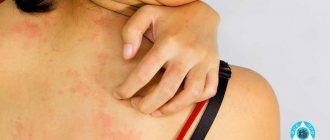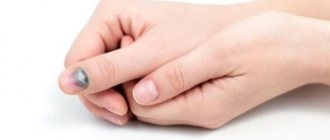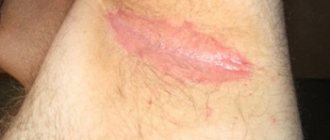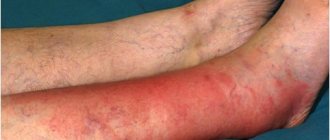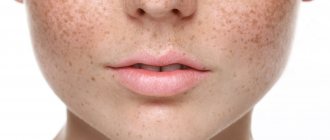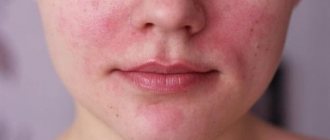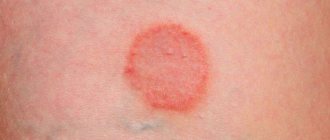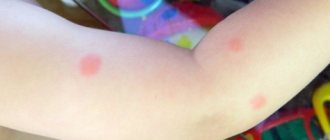Recently we received a question from our reader, after the publication of the article “SPA without a budget! Or an evening of pleasure without leaving home.” In it we talked about how taking a relaxing bath can improve your well-being and relieve emotional stress.
The question was: “I have sensitive skin and after a bath my body becomes covered with red spots. What do you advise?
Yes, this is indeed a burning topic. Due to hard and chlorinated water, many women now experience discomfort after taking a bath and do not even wash their face with tap water. But it’s one thing to experience unpleasant sensations, and another when it’s already on the body - redness.
Let's look at the main reasons.
Allergy
If the body is prone to allergies, then our skin can react to any irritant.
— Various additives in centralized hot water (Chlorine, Iron, Aluminum...); — Any component included in a cosmetic product (shower gel, soap, bath foam, shampoo, etc.); — Residues of detergent on the bathroom. All cleaning products are very caustic and aggressive, and our skin often suffers from contact with them.
- Recommendations:
- If you suspect that you have an allergy, or are already 100% sure, then first of all you need to eliminate the source of irritation.
- If you don’t fully understand what the reaction is, try taking a bath and changing cosmetics every time. When a malicious bubble is discovered, read the ingredients and try to avoid similar components in the future.
- If you suspect chlorine, iron, aluminum..., conduct an experiment. Pre-boil the water and let it settle. Take a swim in this water. Then watch the reaction.
- Avoid chemicals when cleaning your bathtub. Try using baking soda to clean surfaces.
- If an allergen is identified, and for some reason you cannot eliminate it, or you have not found the source of irritation. Be sure to consult a doctor. An experienced specialist will help solve the problem.
How to help?
If your body itches after a shower, what should you do? To treat itching, you need to know exactly the cause of its occurrence.
Itching may be a reaction to hygiene products. If this is the case, then replace your cosmetics with hypoallergenic or children's cosmetics. You can try yourself as a soap maker.
If your skin is sensitive to chlorine, then you should use the most moisturizing wash products. And after a shower, lubricate your skin with some oil, for example Johnson Baby.
If your financial situation allows, you can install water filters.
To remove the manifestations of idiopathic aquagenic itching, antihistamines will be needed. For example, these could be tablets “Suprastin”, “Loratodine”, “Nixar” and others.
If itching is associated with a chronic disease, then to eliminate it it is necessary to cure the underlying disease.
Aquagenic itching occurs several years before the onset of the blood disease. Therefore, those who have it need to be examined by a hematologist every year.
Close location of capillaries to the surface of the skin
Another reason for redness. From irritation and hot water, the vessels dilate and become more visible than usual.
- Recommendations:
- We exclude: rubbing the skin with a hard washcloth, cosmetic scrubs and peels, sudden changes in water.
- If you are a fan of high temperatures, then redness will appear again and again. Take a bath with moderate or even slightly cool water temperature. Reduce the temperature gradually; you can use a special thermometer to control the process. For example, reduce by 1 degree every month. Important!
Lying in cool water for a long time is, of course, not recommended, here you focus on comfort, usually it is about 37-40 degrees. But for the shower you can use less. But remember that a cold shower is already hardening, and a special approach is needed here.
Nervous system disorders
Stress, nervousness, an unfavorable emotional environment at home or at work - all this can be reflected in red spots on the body. In this case, the bath serves as a kind of accelerator that brings out all your experiences.
- Recommendations:
- Analyze the situation, perhaps you will find a certain pattern.
- You can drink herbal soothing infusions yourself. Spend more time outdoors and relax.
- If you feel that you cannot cope on your own, consult a doctor. Sometimes stress is of a deeper nature, then it is advisable to undergo a course of drug therapy.
Sensitive skin.
Sensitivity can be with you almost all your life, or it can appear suddenly.
Symptoms of sensitive skin:
— Excessively whitish tint of the skin; - Tightening sensation after taking a bath; - Irritations that sometimes arise “out of the blue”; — Tendency to form pigment spots; - You periodically experience: burning, swelling, tingling, redness, itching, peeling; — Susceptibility to ultraviolet rays (leading to burns).
- Recommendations. What it is not advisable to do if you are hypersensitive:
- Take an excessively hot bath;
- Rub the skin with a hard washcloth;
- Use scrub or peeling frequently;
- Clean the bathtub with aggressive chemicals
What is better to avoid:
- From various bath foams, gels, soaps - having a hard or “questionable” composition;
- Add salt and/or potent essential oils to the bath.
Beauty tip:
— Buy eco-friendly or natural body cosmetics, without chemical components; — Or try making homemade cosmetics yourself; — Take a bath with herbal infusions. Choose those that will relieve irritation and soothe sensitive skin - Install a main filter for water purification (today this is an excellent solution for any skin type)!
What to do if itching occurs? Prevention methods
To help cope with itching:
- Use of special cosmetics. This may include a nourishing cream or softening milk, as well as a soft body oil, which should be applied immediately after a shower to still damp skin.
- Warm baths with herbal decoction. To eliminate itching, you can add menthol, barley decoction, and juniper extract to the bath.
- Rubbing the skin. Salicylic alcohol is often used for these purposes. You can infuse peppermint on it and use it for rubbing.
- Lotions. If any part of the body itches, you can apply lotions made from burdock infusion. To prepare it you will need 400 ml of water and 1.5 tbsp. l. plant roots. The ingredients must be cooked for 30 minutes.
- Healthy drinks. For example, you can use regular dill. It must be crushed as finely as possible and placed in a glass of boiled water. You need to drink a glass of this every day for 7 days.
- Relieve nervous tension. If a person is very upset, he should definitely try to calm down and relax. In most situations, itching and tingling disappear.
Sometimes there are situations in which a person himself cannot help himself, although he knows perfectly well how to do it. In such cases, all attempts are in vain; the help of a specialist is advisable. It is he who will be able to help establish the true cause of the disease and advise how to cope with it.
Stress
Washing
We invite you to familiarize yourself with Acne on the face and body in adult men and women: causes
Skin allergies due to excessive production of thyroid hormones are associated with the formation of kinins, a rise in body temperature and xerosis.
Itching associated with liver disease is provoked by a high content of bile acids in the blood or prostaglandins and histamine. The allergy is generalized and worsens when pressing on the skin, as well as at night. You need to be attentive to such manifestations, otherwise hemochromatosis may occur.
In case of skin diseases, itching does not depend on water. It’s just that such procedures can spread microorganisms throughout the body.
If you have worms, your body itches after a shower, this is due to the processes of poisoning the body with waste products of parasites.
Diseases of internal organs
If all of the above reasons do not apply, we can assume some kind of internal organ disease. Our body is an integral and complex system; when one organ is disrupted, there is often a reaction to another. And since the skin is our largest organ, we can observe a side effect - from the outside.
Recommendations: There is only one recommendation here - consult a doctor. Perhaps by external manifestations our body, as it were, “draws attention” to a more important problem.
In this article, we briefly examined the main reasons why red spots may appear on the body after taking a bath. If you, like our reader, want to eliminate this unpleasant symptom, write in the comments:
Thank you for your attention! Your cosmetologist-esthetician Alina Kamysheva.
Products for sensitive skin:
Selling Aged 2009 Twitter accounts ?
. General Information? ?? Email Address Verified ?? All accounts come with full access to the original email that was used to create the account! ?? 11 years old ??Comes with little or no followers, following ??Comes with/without bio or profile picture?
Causes of red spots on the body after a shower
As you know, the autonomic system of our body is responsible for the functioning of internal organs, such as the pancreas, sebaceous and sweat glands. With a negative impact on the system, the surface of the skin changes its color - narrowing of blood vessels leads to a pale color of the epidermis, and when the capillaries dilate, the skin acquires a reddish tint.
Interspersed with a red tint can be found both in some areas and throughout the body. The nature of red spots on the body after a shower can vary. Also, the rashes can be without itching, but sometimes, on the contrary, they itch a lot. If your skin is sensitive and prone to allergies, red spots after swimming can be caused by exposure to soap, water, and even sweat.
Itching and redness of the skin indicate pathologies such as:
- blood disease;
- liver disease;
- lack of vitamins;
- allergic reaction to components included in detergents;
- water too hot;
- reaction of the epidermis to chlorine compounds contained in large amounts of water;
- oncology;
- endocrine system failures;
- various dermatitis;
- worms.
Other causes of stains
A visual examination of the nature of the spots will help determine what it could be and what exactly was the prerequisite for the appearance of skin rashes after swimming.
So, dark red, uneven spots are associated with a malfunction of the nervous system. They are localized mainly on the neck, arms, face, but soon pass. To avoid their occurrence, stressful situations should be avoided.
What to do if your skin itches from hot water?
There can be many reasons for the appearance of unpleasant redness on the body or face.
The most harmless are external irritants. It could be hard or too hot water. Reacting to such factors, the skin will become covered with red spots, which will be irritation and nothing more. Another reason may be the use of scrubbing products and an abrasive body washcloth. Red spots in this case will be evidence of micro trauma to the skin. Next, you can consider more serious reasons for the appearance of spots on the body. One of them is emotional overexcitation and a nervous state.
Dermatological diseases can also appear as spots on the body after contact with water. One of these diseases is pityriasis versicolor. This is a mild form of the disease that may not manifest itself for a long time, and all symptoms will be reduced to spots on the body after a shower.
To summarize, we can highlight the following reasons for the appearance of red spots on the body after drinking water:
- External irritants: water, hygiene products, washcloths.
- Allergic reactions to the composition of water.
- Dermatological diseases.
- Nervous system disorders.
- What do spots on the skin look like after water?
The spots that appear after external irritants have an uneven shape and blurred edges. They will look like small redness in different areas of the skin. Those spots that indicate ringworm or allergies look like small scaly bumps. If the spot appears due to allergies or other dermatological abnormalities, it will itch.
Of course, it is better not to try to diagnose yourself, much less cure it. If spots on the body appear due to external irritants, they will go away on their own. Typically, such irritation goes away within a few hours after contact with water. But this skin reaction should not be ignored.
Such methods are no longer suitable for chronic skin reactions to water. It is better to consult a dermatologist for a detailed consultation. He will select medications in the form of ointments and lotions based on medicinal components. If spots on the body after water are caused by a condition of the nervous system, you should consult a neurologist so that he can prescribe sedatives depending on the patient’s specific situation.
In any case, such a signal from the body should not be ignored. It's too complicated. But if you learn to see even the most minimal deviations, you can start treatment on time and avoid negative consequences. Red spots on the body after drinking water, this doesn’t sound scary or even serious. But this is not always a banal allergy. An extra visit to the doctor will become self-care and insurance against unexpected illnesses.
Stress
If you have experienced serious experiences such as the loss of a loved one, separation, problems at work, study, then probably the cause of itching after taking a shower is due to nervous tension. In such a situation, the body’s defense systems are disrupted.
Try to relax more and spend time outdoors. It is also recommended to drink herbal tea (mint, chamomile).
If the symptoms do not disappear, consult a doctor, because only with qualified help can a serious psychological disorder be cured.
Remember, you may have recently changed this type of detergent. Some substances in the powder can cause an allergic reaction and cause itchy skin after a shower.
The skin will not itch if the detergents and detergents are chosen correctly
Obviously, here we are talking about skin contact after water procedures with the washed item.
Use a powder that meets the following criteria:
- hypoallergenic;
- good rinsability;
- absence of fragrances (mixtures in the composition that give a pronounced aroma to the product).
These cosmetics can also have a negative effect on the skin and cause itching. Especially if we are talking about a new or low-quality shampoo that has been used for a long time (since an accumulation effect is possible). In the composition of these cosmetics you can find components and chemical compounds that provoke allergies.
Choose products for water procedures, preferably with flax or oat extracts and without SLS (sodium lauryl sulfate) in the composition. To prevent itching after bathing, use hypoallergenic cosmetic products (baby oil, body milk), and apply compresses with mint infusion.
Some women experience itching on the chest, back, lower or upper limbs after putting on clothes after showering. Synthetic fabric interferes with normal heat transfer. It does not absorb moisture, as a result of which the skin “does not breathe.”
Wear underwear made of cotton or silk.
Hard water
Due to the high chlorine content, it can tighten and dry out the skin, causing severe discomfort and the desire to itch.
Add baking soda to the water, install filters (for example, those containing carbon sorbent). Take a warm bath, adding various oils (essential menthol or juniper), decoctions of herbs and flowers of calendula or chamomile (they will help soothe the skin).
A delayed food reaction develops at least two hours later, but more often several days after eating certain foods. The patient often cannot associate it with any specific product. Due to its uncontrollable nature, allergies can appear at the most unexpected moment (for example, after swimming).
Review your diet. An allergist or nutritionist will help you determine your diet. The patient is recommended to undergo food intolerance tests, which can more objectively assess a person's allergic reaction to food.
Taking medications
For example, due to taking COCs - combined oral contraceptives - a pathological reaction in the form of urticaria may occur after taking a shower.
Only a doctor can adjust the treatment.
Pregnancy
Itching can appear at any time, and it differs in intensity and is accompanied by a skin rash (in this case we are talking not only about the desire to itch during water procedures). This condition may be an alarming signal that serious processes are occurring in the body that threaten the health of the expectant mother and baby.
If this problem occurs, immediately consult a doctor so that he can rule out fetal pathology, cholestasis and other diseases, and prescribe a course of treatment.
We invite you to read: Why do red dots appear on the body?
Climax
Often itchy sensations in the upper body occur in women during this period.
Contact your doctor. Basically, this problem is associated with “hot flashes”; the patient is usually recommended to undergo diagnostic testing to determine the levels of plasma gonadotropins.
Often itchy skin does not indicate sensitivity to water at all, but the presence of a serious disease. The most interesting thing is that after taking water treatments, attacks of scabies, eczema, and dermatitis worsen. Therefore, if you rule out dermatitis and eczema, since you have never suffered from them, then it’s time to suspect a scabies mite.
If you have recently visited a bathhouse, sauna or swimming pool, you may well have contracted this disease. In adults, the disease may not be acute and may not produce any obvious symptoms. Itching usually appears immediately after drinking water. Please note that the skin is more likely to itch after taking a shower or bath in the winter.
What to do if your skin itches from hot water:
- This is due to the fact that in winter the ambient temperature decreases, and excessive sensitivity to cold may occur. In addition, central heating radiators dry the air, thereby drawing water out of the skin.
- Be sure to take care of moisturizers if you have very dry skin and use protective creams before going outside. This applies not only to the face, but also to other parts of the body that come into contact with air. That is, this is the neck, as well as the arms.
- If not only the face itches after taking a shower, but also the whole body, then the reason is in the water or excessive sensitivity to the salts that are dissolved in it.
- Of course, for adults, swimming in boiled water is not an option, so it is necessary to look for other ways to combat itchy skin. Below is a list of the most effective lotions and creams to help relieve itching after showering or bathing.
Unpleasant sensations
After taking water treatments, to reduce the likelihood of irritation and itching on the skin, you can resort to some tricks. After taking water procedures, it is necessary to lubricate the skin with emollient ingredients. The best thing to eat is milk or body cream.
Itchy skin after a shower, how to get rid of it:
- Thanks to such remedies, it is possible to get rid of itching and burning after taking a shower. Among them are products containing shea butter, tea tree oil, and grape seed oil.
- They are antiseptics, while softening the epidermis and preventing the occurrence of skin diseases. It could be dermatitis or urticaria. In this case, it is recommended to take antihistamines.
- Some doctors recommend using medications such as capsaicin if you are overly sensitive to water. This substance is found in red pepper and irritates the skin.
- Helps stimulate receptors, reducing their sensitivity. Thanks to the use of such emergency therapy, over time the skin becomes less sensitive and practically does not react to water.
- The most interesting thing is that often itching after taking a bath occurs in people suffering from atopic dermatitis. It is recommended to take a bath with liquid paraffin. Emollients are excellent. Among them we can highlight Physiogel.
Washing
Female representatives often note the appearance of acne after visiting the bathhouse. Although bath procedures, in principle, should produce the opposite effect. After washing in the bath, the pores open and cleanse, which has a beneficial effect on the condition and appearance of the skin. So why sometimes acne does not go away, but appears?
People themselves are to blame for this because they do not follow basic hygiene rules. During a visit to the steam room, heavy sweating occurs, which is why a person may take someone else’s towel or simply start wiping the sweat from his face with his hands. At this point, it is very easy to introduce bacteria or dirt into open pores.
Stains on the body after a bath
In the absence of any serious diseases, spots on the body after a bath should not cause concern. Skin changes, in the form of red rashes, are caused by a subcutaneous network of capillaries, which are activated during the procedure.
The network of capillaries has heterogeneity in its structure: in some places there are more vessels, in others there are fewer. This explains the red spots after the bath. Changes begin during the soaring stage, but they become noticeable only after the procedure is completed.
Bath procedures, without a doubt, have a beneficial effect on the health of the body as a whole and blood circulation as well. Therefore, if you notice skin changes, you should not panic and refuse procedures. But, in any case, the degree of overheating should be controlled.
To do this, using a tonometer, you need to test your body and its reaction to the duration of your stay in the bathhouse. So, you can find a “golden mean” specifically for your body: a safe length of stay, the maximum permissible temperature, optimal breaks between sessions.
After the bath, to normalize blood flow, it is advisable to swim in the pool or plunge into the ice hole.
In order to avoid negative consequences from going to the bathhouse, you must adhere to the following recommendations:
- Applying creams to areas of the body before the session is undesirable, as this clogs the pores.
- Using soap when steaming greatly dries out the skin.
- When using a bath broom, there will be many times more spots on the body. But thanks to this, blood circulation improves. The broom should be birch at the beginning of the session (opens the pores) and oak at the end (closes the pores)
- A light snack is allowed before the bath.
What to do if redness appears on the skin after swimming
If redness is detected after a shower, appropriate measures should be taken to eliminate and prevent itching, peeling, and rashes on the body. Some pathologies cannot be dealt with on your own; you will need qualified help from a dermatologist.
According to statistics, a common cause of redness in areas of the body is an allergic reaction. Typically, skin changes disappear after stopping contact with the allergen. You should also avoid prolonged exposure to water with your skin, thereby avoiding serious consequences.
Drug treatment is prescribed only by a doctor, after a thorough diagnosis and identification of the true causes of skin redness.
As already noted, with disorders of the central nervous system, itching and flaking of the skin are observed. Causes of this type of pathology:
- stress;
- lack of sleep;
- anxiety;
- constant anxiety.
After normalization of the regime and psycho-emotional background, red skin spots after swimming do not appear.
With an infectious disease caused by viruses or fungi, the number of red spots increases. Therefore, it is recommended to seek medical help as soon as possible.
Prevention
To prevent skin problems and overall health, it is worth paying attention to prevention. Without determining the reasons, it is contraindicated to apply creams and declarative cosmetics to the affected areas.
Therefore, folk remedies are most likely suitable here. For example, washing with a decoction of birch buds, masks made from bread, and herbal tinctures.
To relieve irritation, peeling, and tightness, the following mask is suitable:
- Chop 2 tablespoons of parsley and add hot water (half a glass).
- Leave for 30-40 minutes.
- Add a spoonful of sour cream.
- Apply to problem areas.
Herbal tincture for face:
- Calendula, chamomile and St. John's wort, taken in equal proportions, are infused in hot water.
- Soak the crumb of black bread in the broth.
- Apply evenly over the face.
- Keep for 20-30 minutes.
- Rinse off with a small amount of warm water.
Conclusion
Doctors warn! Shocking statistics - it has been established that more than 74% of skin diseases are a sign of parasite infection (Accarida, Giardia, Toxocara). Worms cause enormous harm to the body, and the first to suffer is our immune system, which should protect the body from various diseases. The head of the Institute of Parasitology shared the secret of how to quickly get rid of them and cleanse your skin, it turns out that’s enough. Read more .
The appearance of red spots, itching and flaking on the body after swimming alarms the wearer. You should not let the disease take its course. The overwhelming majority of cases prove that defects and external changes in the skin are signs of changes that have begun in the body.
The appearance of redness on the body and face after taking a bath or shower may indicate various health problems and poor functioning of internal organs. Most of the diseases known to us are manifested by a rash and changes in the skin. Let's consider further what causes red spots to appear on the face after a shower, and how to treat them.
Prevention
To prevent problems with the skin and health problems in general, you need to engage in prevention. Many doctors recommend washing your face with a decoction of birch buds and making special masks. For example, you can make a mask from bread.
We make an infusion of calendula, chamomile, St. John's wort:
- soak the crumb of black bread in any broth;
- apply the resulting mass to the face;
- keep the mask on for about twenty minutes.
Another very effective mask for flaky redness:
- three tablespoons of chopped parsley;
- pour half a glass of boiling water;
- the decoction is infused for half an hour;
- add sour cream until you get a thick paste.
This mask allows you to soften the skin, relieve irritation and tightness. Relief will be felt immediately after the first procedure.
You can also try this mask at home:
- take three tablespoons of cottage cheese;
- mix with a teaspoon of honey (used only if the redness is not allergic in nature);
- add lemon juice if desired.
Before doing anything, consult a doctor so as not to aggravate the problem, but to cure and make the skin soft and beautiful.
After the bath, red spots appeared on my face! What should I do? The fact is that once I already had such a thing that when I washed myself in the bathroom, red spots appeared (on my forehead and cheeks), I wiped them with calendula tincture and the next morning the spots appeared again, but within 1-2 hours they passed. Maybe it's because my skin is very dry
(the skin above the eyebrows and between the eyebrows is very flaky) (sometimes it turns red)
Kind people tell me WHAT COULD THESE RED SPOTS APPEAR AFTER A BATH AND HOW TO GET RID OF THEM SO THAT THEY WILL GET AWAY UNTIL TOMORROW MORNING. 8 years
How the body reacts
The human body has three sections of the nervous system, each of which is responsible for the functioning of certain organs:
The autonomic system, in turn, reacts differently to irritation by external factors. Since this type of nerve cells is responsible for the functioning of the blood vessels of internal organs such as the pancreas, sebaceous and sweat glands. Due to the impact of irritating factors on the autonomic nervous system, the skin becomes pale, blood vessels narrow, or, conversely, capillaries dilate, causing the surface of the face to turn red.
The systematic appearance of spots on the face indicates improper functioning of the nervous system, which manifests itself in the form of changes in the structure of the skin.
Main reasons
Red spots may appear for reasons such as:
- long exposure to ultraviolet rays;
- hot water;
- stress, nervousness;
- physical stress;
- lack of vitamins;
- acne;
- seborrhea.
After taking a shower, redness may appear for the following reasons:
- water too hot;
- water contrast;
- hardness of water;
- rubbing the skin with a hard washcloth;
- irritation from used detergents;
- cosmetic scrubs.
What to do?
If, after regular water treatments, strange red spots appear on your body, you should take a closer look at your body. Doctors recommend:
- Stop using washcloths, scrubs and detergents for a while.
- Do not take too cold or hot showers, use moderate temperature water.
- If itchy red spots appear, take any antihistamine in an age-appropriate dosage.
- Do not rub your skin with a hard towel or apply various creams and lotions to it.
If red spots appear again and again, and the cause of their occurrence remains unclear, it is better not to experiment with your own health and consult a doctor - first, a regular therapist. Later, you may need the help of an allergist or dermatologist.
Unpleasant sensations
Other reasons
- Skin reactions to hot water most often occur in winter. Heating, dry air, and the contrast when leaving the room outside can cause skin cells to dry out, peeling begins, and red spots appear on the skin from prolonged exposure to hot water.
- The close location of capillaries in relation to the surface layers of the epidermis is another reason for redness. Due to irritation, the vessels dilate and become more visible than usual.
- Allergic reaction. If a person is prone to allergies, various additives in centralized hot water and the presence of chlorine can cause a rash.
- Sensitive skin types may be irritated by chemicals such as shampoo, body wash, toners, and soap. Almost anything that comes into contact with the skin can be a provocateur.
What to do if your skin itches from hot water?
People with very dry, sensitive skin are often recommended to use special products during showering that prevent large amounts of moisture from being removed. They carefully care for the skin and form a film on its surface that prevents the epidermis from drying out. Below we present a list of products for sensitive and atopic dermatitis-prone skin.
List of shower gels for sensitive skin:
- Elfa Pharm. Atopi Med
- Aveeno, For children, treatment of eczema
- SeSDerma Atopises Bath Gel
- Bioderma Atoderm Gentle Shower Gel
Clean body
Unpleasant sensations
Washing
Skin diseases
The body most often displays symptoms of various skin diseases, including sexually transmitted diseases, which are not always detected in the early stages. So, diseases that can cause a rash on the face after a shower:
- pityriasis versicolor;
- lupus;
- scleroderma;
- psoriasis;
- sycosis;
- seborrheic dermatitis;
- lichen planus.
Symptoms in the form of spots can last up to several hours, sometimes more. All this should force you to pay attention to the problem, identify the real cause of the disease and begin treatment.
Diagnostics
If spots appear constantly after a shower, you should immediately consult a doctor and determine the cause.
- Allergies to medications taken can also be triggered by a sharp increase in body temperature. If possible, drug treatment should be stopped to see if the redness continues. Or you can change cosmetics, pre-boil and let the bathing water stand to eliminate these causes of the problem.
- A more common cause of any rash is cosmetics that are not suitable for your skin type. Even while taking a shower, when makeup is washed off, allergies can become more widespread and visible. For treatment you only need to change cosmetic products. It's a good idea to take an allergen test to find out what may be causing your skin to break out when exposed to hot water.
- In case of increased nervousness, severe stress, spots on the skin can be eliminated if you undergo a course of sedative medication.
Treatment
Once the correct diagnosis is made, the dermatologist prescribes appropriate treatment.
- Eczema and psoriasis. It is treated comprehensively with antiseptic medications and relieves itching locally.
- Allergy. Antihistamines are taken and sources of allergies are excluded.
- Adverse effects. Protecting your skin from sun, wind and extreme cold is the best medicine.
- Redness of the skin from stress. Treatment of the nervous system, soothing teas and tablets.
- Cosmetics. You need to contact a cosmetologist and choose the right facial skin care products.
- Seborrhea. It is recommended to lubricate the affected areas with products containing Ketoconazole and zinc.
- Diseases of internal organs. Treatment of an established diagnosis only after a complete examination.
If the spots are peeling
Red spots that appear after a hot bath may not go away for a long time, peel and itch. This can happen constantly and last for a long time. The skin around the perimeter becomes rough and scales appear. The situation is quite uncomfortable. If flaking is not treated immediately, it can spread further throughout the body. Regularly appearing flaky redness indicates serious health problems (with the liver and gall bladder).
Self-medication
For whatever reason, redness appears on the face, you should not rely on your knowledge and strength and try to solve the problem yourself. You need to see a dermatologist or family therapist to get an accurate diagnosis.
Without identifying the reasons, it is not recommended to apply nourishing creams or alcohol-containing tonics to the affected skin, and do not cover the spots with foundation or powder. Try to touch your skin as little as possible.
Diagnosis and methods of eliminating allergic itching
- Using a special softener filter, sold in stores, you can make the water less hard. Also, bathing water is softened by adding baking soda to it.
- Sometimes allergies can be caused by water at a certain temperature. In this case, it is necessary to wash only with water suitable for the body.
- You should try replacing “aggressive” soap or gel with another product containing softening components (for example, oats or starch).
- Perhaps the itching after a shower will disappear if you change the washcloth to a softer one.
- On a washed body, it is recommended to wear underwear that does not irritate the skin - made of cotton.
- Changing your detergent may help. In any case, clothes should be rinsed thoroughly when washing.
- If you are taking any medications or medications and your skin reacts negatively to them, you should stop taking them.
- You need to pay special attention to your diet. It happens that the skin condition is worsened by eating certain foods (spicy, pickled).
If a person’s body itches after a shower, first of all you need to find out why it happened. We mentioned above that there are many reasons for this phenomenon, from the most harmless urticaria to serious systemic diseases, which without treatment can lead to serious health problems.
One of the preventive measures for itching is proper nutrition. All fried, spicy, salty foods and strong tea and coffee also lead to itching. You need to stop eating unhealthy foods or at least reduce their quantity. A proper diet normalizes the functioning of internal organs and improves your mood. At the same time, you need to consume vitamins, iodine-containing products, and more fruits and vegetables.
You may also need to change your skin care products, as they can also cause irritation. The easiest way is to use hypoallergenic products or baby soap. This will relieve you of allergic problems.
If all preventive measures do not help, you should definitely consult a specialist. The doctor will prescribe the necessary tests that will help determine the cause of the disease, and then prescribe the required treatment. We must not forget about this, since timely diagnosis and properly initiated therapy will help a person live a long life.
